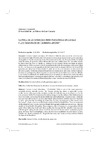Identificador persistente para citar o vincular este elemento:
https://accedacris.ulpgc.es/handle/10553/42284
| Campo DC | Valor | idioma |
|---|---|---|
| dc.contributor.author | Quevedo García, Francisco Juan | en_US |
| dc.date.accessioned | 2018-10-26T09:44:01Z | - |
| dc.date.available | 2018-10-26T09:44:01Z | - |
| dc.date.issued | 2018 | en_US |
| dc.identifier.issn | 1507-7241 | en_US |
| dc.identifier.uri | https://accedacris.ulpgc.es/handle/10553/42284 | - |
| dc.description.abstract | Carmen Laforet (Barcelona, 1921-Madrid, 2004) ha sido una de las escritoras más importantes del siglo XX en España. Su literatura muestra un particular interés por la naturaleza, destacando su vínculo con el mar, como observamos en La isla y los demonios (1952). Su ciudad natal, Barcelona, le aporta la cultura del mundo marítimo mediterráneo. Por otro lado, cuando la autora tiene dos años su familia se traslada a Gran Canaria, donde vive hasta su regreso a Barcelona en 1939; su estancia infantil y juvenil en la isla le da el conocimiento de la atlanticidad. La isla y los demonios es la segunda novela de Carmen Laforet, después del éxito de Nada (1945), ganadora esta del primer Premio Nadal. El relato de La isla y los demonios se ubica en la isla de Gran Canaria, y si bien las alusiones biográficas no son exactas se relacionan con las vividas por la autora. La protagonista, Marta Camino, es una joven de espíritu libre cuyo padre ha fallecido y cuya madre ha enfermado. Su rebeldía entronca con un sentimiento de cercanía con la naturaleza, en la que adquiere gran relevancia el espacio del mar, con toda su simbología, que para la joven viene a connotar la armonía y la libertad para huir y dejar atrás los demonios de la isla. | en_US |
| dc.description.abstract | Carmen Laforet (Barcelona, 1921-Madrid, 2004) is one of the most prominent twentieth-century Spanish writers. Her literary production shows a particular interest in the nature, with a particular emphasis on her ties with the sea, as we observe in La isla y los demonios (1952). Her hometown, Barcelona, brings to her the culture of the Mediterranean maritime world. On the other hand, her childhood and youthful stay in Gran Canaria -when she was two years old her family moved to this island, where she lived until her return to Barcelona in 1939- gives her the knowledge of Atlanticity. La isla y los demonios is the second novel by Carmen Laforet, after a successful Nada, winner of the first Nadal Prize. The story is situated on the island of Gran Canaria, and even though the biographical allusions are not exact, they are similar to those lived by the author. The protagonist, Marta Camino, is a young orphan of lively spirit whose father has died and whose mother has become ill. Her rebellion interconnects with her great feeling for the nature, in which the space of the sea and its symbolism acquire great relevance. The novel highlights, above all, that nexus established between Marta Camino and the sea, which symbolizes for the girl the harmony and freedom to flee and leave behind the demons of the island. | en_US |
| dc.language | spa | en_US |
| dc.relation.ispartof | Itinerarios (Warszawa) | en_US |
| dc.source | Itinerarios [ISSN 1507-7241], v. 27, p. 7-25 | en_US |
| dc.subject | 6202 Teoría, análisis y crítica literarias | en_US |
| dc.subject.other | Carmen Laforet (1921-2004) | en_US |
| dc.subject.other | Novela | en_US |
| dc.subject.other | Personaje | en_US |
| dc.subject.other | Espacio | en_US |
| dc.subject.other | Mar | en_US |
| dc.subject.other | Novel | en_US |
| dc.subject.other | Character | en_US |
| dc.subject.other | Space | en_US |
| dc.subject.other | Sea | en_US |
| dc.title | Claves de la simbiosis mar-personaje en la isla y los demonios de Carmen Laforet | en_US |
| dc.title.alternative | Keys to the sea-character symbiosis in la isla y los demonios, by Carmen Laforet | en_US |
| dc.type | info:eu-repo/semantics/article | en_US |
| dc.type | Article | en_US |
| dc.identifier.doi | 10.23825/ITINERARIOS.27.2018.01 | en_US |
| dc.identifier.scopus | 85052826600 | - |
| dc.contributor.authorscopusid | 57203752799 | - |
| dc.description.lastpage | 25 | en_US |
| dc.description.firstpage | 7 | en_US |
| dc.relation.volume | 27 | en_US |
| dc.investigacion | Artes y Humanidades | en_US |
| dc.type2 | Artículo | en_US |
| dc.utils.revision | Sí | en_US |
| dc.identifier.ulpgc | Sí | es |
| dc.description.erihplus | ERIH PLUS | |
| item.grantfulltext | open | - |
| item.fulltext | Con texto completo | - |
| crisitem.author.dept | GIR Pensamiento, Creación y Representación en el ámbito de los Estudios Culturales | - |
| crisitem.author.dept | Departamento de Filología Hispánica, Clásica y de Estudios Árabes y Orientales | - |
| crisitem.author.orcid | 0000-0002-5446-8106 | - |
| crisitem.author.parentorg | Departamento de Filología Hispánica, Clásica y de Estudios Árabes y Orientales | - |
| crisitem.author.fullName | Quevedo García, Francisco Juan | - |
| Colección: | Artículos | |
Visitas
374
actualizado el 17-ago-2024
Descargas
1.036
actualizado el 17-ago-2024
Google ScholarTM
Verifica
Altmetric
Comparte
Exporta metadatos
Los elementos en ULPGC accedaCRIS están protegidos por derechos de autor con todos los derechos reservados, a menos que se indique lo contrario.
